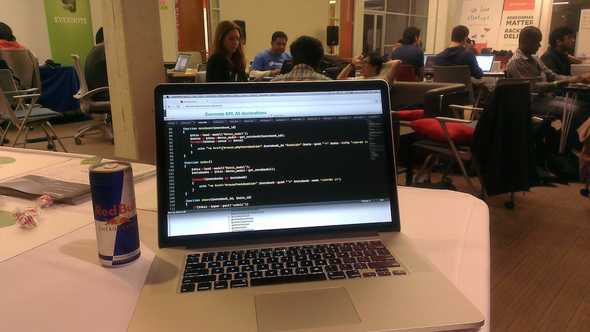Five reasons I attend hackathons
October 22, 2015 |
I’ve been to over a hundred hackathons over the past six years. I am often asked about why I participate in hackathons, and why I continue to hack after attending so many. I used to go for the free food and drinks. Who could turn down a free meal and not have to cook ? While a free meal is still tempting (if it isn’t pizza), I have gained other benefits from attending hackathons regularly. Here are five reasons that come to mind.
Freedom to try anything
First, it gives me freedom to try out my wildest ideas without worrying about having to account for every development hour. A hackathon typically lasts between 24 to 48 hours. It is a relatively small amount of time to invest in trying out a new idea I have. If the idea turns out to be a terrible idea, I can always stop pursuing it. Projects at work and projects for clients really don’t offer this flexibility and reduce what I call the “fun factor.”
My first hackathon was a way for me to express my creativity outside of my day job at the time. I was responsible for a segment of a product we were building, which had rigid plans. This limited my creativity, and didn’t permit diversion that can often generate new approaches. It is important to have an outlet to express your creativity.
I’ve learned to use my creativity and not be afraid that my ideas might be stupid. Of course I still have those embarrassing moments. However I’ve discovered that if I don’t share my ideas, I will never know if they are truly stupid, or brilliant ideas that were disguised.
Once, when I presented what I thought was a failure, people came up to me afterwards and told me they were inspired. Really? Had I never shared my “failure”, others wouldn’t have seen it. By inspiring others, my failure can turn into an even better idea.
Exposure to sponsor APIs
Attend any hackathon and you’re likely to see at least one company sponsoring the event. Most have APIs they want you to try out and see what you can build with them.
I have been involved in several startups and attend tons of technical conferences in search for technology that can either reduce development time or add capabilities that would require resources. In the past couple of years, for example, we’ve seen Internet of Things and the connected automobile become more prevalent. Not only do I get to try out the technology, but there are dedicated experts that can walk me through ways of using the technology.
When I sat down with IBM Bluemix mentors earlier this year at a hackathon and learned about IBM Watson, a whole new world of possibilities opened up. To be honest, data science and performing data analysis isn’t exactly my cup of tea. But with access to APIs that can analyze a person’s personality and another that returns sentiment scores, I can be up and running with these powerful capabilities in a matter of minutes!
I now have knowledge of how to analyze data and it helps improve the prototypes I build. Who knew I could sort emails for positive sentiment and play them in the morning on the way to work? I can also find that perfect personality match, err, for my “friend.”
Networking
At my first hackathon I was really shy. I preferred coding in the corner instead of talking to people. I’ve discovered that talking to people can open up a lot of conversations. From finding out about future events and conferences, to finding out new about apps and hardware others have recently discovered, to learning about what is on the horizon, you can learn quite a bit from networking.
Even if you don’t talk to everyone, your presence can be valuable. There’s a core group of developers who I see regularly at hackathons. People take note of what you do and eventually you’re known in the community for your expertise and experience. Through networking, I’ve been asked to speak at conferences and have consulted for side-projects.
This network is also really helpful if you need help to solve a specific problem. Buy me a cup of coffee and let’s brainstorm.
Building my confidence
Public speaking is a fear for many. After you build your prototype at a hackathon, you have the opportunity to present it in front of judges, developers, business people, and others. Not only do I have more confidence to speak in front of a group of people, I have also learned how to present when things don’t always go as planned.
From failures with projectors, wifi, or pesky bugs in code, learning how to deal with these technical difficulties in front of an audience is a good skill to have. These skills are also useful when dealing with customers and clients. Some days things won’t work and you have to fight the proverbial fires, making things right with customers. Instead of freezing up and saying that nothing can be done, I’ve learned to have backups and ways to deal with situations that arise. People are surprisingly forgiving when you’re honest and share with them what is really happening.
There’s always a new adventure
While it may seem like hackathons can become repetitive, my experience is otherwise. Hackathons may share commonalities, but each offers a unique experience. The people, the organizers, the sponsors, the ideas, the venue and much more contribute to the experience. Maybe one offers massages, during which you get inspired to try a different option than you might have initially. Another might offer midnight waffles, where you meet another hacker in line and end up working with her on a side-project.
I love to mash together sponsor APIs and see what can be done. Think of all the combinations that can be done with four or five sponsors. I’ll leave the math as an exercise, ;-). Now, for each combination there are tons of ideas that can be generated. It’s up to you what type of adventure you want to have at a hackathon.
I hope these reasons have motivated you to check out a hackathon and see what you can gain from the experience. There are quite a few hackathons this weekend. And they offer free food and drinks.

